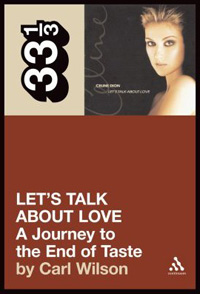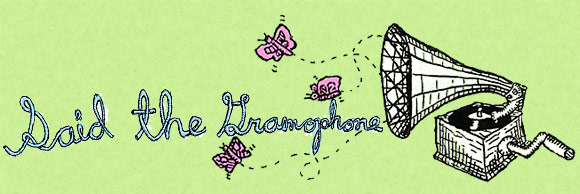
Monday, Tuesday and Wednesday this week, we at StG are writing in response to a book called Let's Talk About Love: A Journey to the End of Taste. It was written by our friend Carl Wilson, as part of the 33 1/3 series. Dan wrote some words yesterday, and Jordan's comments will follow tomorrow.
The book launch for Let's Talk About Love takes place in Toronto on Wednedsay: a free show featuring Final Fantasy, Laura Barrett, The Blankket & others.
Carl's book is ostensibly about Celine Dion's Let's Talk About Love album. But that's sort of like saying that a knock-knock joke is about the knock at the door. It's a book about taste - where it comes from, what it says about us, and how it keeps us isolated from each other. It touches on kitsch, chanson, Hurricane Katrina, the avant-garde, Elliott Smith, Quebec sovereignty, Las Vegas, mass art, and in the book's most heartbreaking moment, Buddy Holly. It is concerned with aesthetics, identity, and the role music (and music criticism) plays in our lives. It is only about 150 pages long but it is packed so full of insight, of ideas & wit & play & rigourous thinking, that it'll sustain weeks, months of thinking. It's also really fucking funny. But most of all, and the thing that made me certain that we ought to write about it here -- it is a book that is tender, beautiful and unexpectedly poetic; a book concerned above all with the human condition, and all us wanderering wanderers. A treatise on aesthetics cut through (like a hot knife) with the deeply personal. Let's Talk About Love was perhaps the best book I read in 2007.
The Beatles - "You've Got To Hide Your Love Away".
In 2000 I was 18 and my friends would joke that I didn't own any music that wasn't sad. I'd laugh and put on Bright Eyes' "Padraic My Prince" ("I had a brother once / he drowned in a bathtub / before he ever learned how to ta-a-a-alk"), enjoying the archetype. My pet artists were (and largely still are) Nick Drake, Radiohead, Belle & Sebastian, and maybe Neutral Milk Hotel. I liked more than anything the bittersweet first disc of The Beatles' Anthology II.
I could document this in more detail, transcribe some of the mixes I made (almost all of sad songs). But what I'd rather reflect on today is what this impulse meant. What did it say about that boy (and what does it maybe say about me today)?
That I was a melancholy kid? I guess. I had spent most of high-school in an unreciprocated crush, carrying it with me wherever I went, wallowing in the "hopeless" part of romance. But my peers were just as love-sick, just as pubescent (& for the most part, just as single). And they weren't (often) in their bedrooms listening to "You've Got to Hide Your Love Away" on repeat. My home life was great, my school-life fine. I wasn't bullied or abused, had lots of friends and extra-curricular activities. I can't have been any more sad than others around me. So why did I want to be the one who listens to sad songs. Why was I attacted to that aesthetic?
Some answers can be found in the way I viewed the alternatives. I remember ranting about "angry music" - to me it was "mean", "stupid" or just "immature". These aesthetic judgements are way more loaded and arbitrary than I realised at the time. (I'm not just talking about the now-stale argument over instrumental virtuosity.) Were Limp Bizkit or Blink-182 really "mean", other than to the assholes who abused them? Was Rage Against the Machine's shouting really less "mature" than Stuart Murdoch's wallflower ballads? And are Kurt Cobain's insights any dumber than Thom Yorke's?
Thinking about it today, I read my impulses differently. I valued introverted music over extroverted music - self-reflection over activism. Never songs that compelled one to action (let alone to dance): instead, passivity, meditation, sorrowful stasis. There's something almost antisocial in a lot of sad songs. My desire to be grown up didn't manifest in a curiosity about sex & drugs, let alone the messy, frustrating stuff of actual adult life. Instead I wanted to be "literary", "serious" - to dwell in a chaste, almost bloodless world, rich in metaphor, some place gentle as a lukewarm bowl of porridge. The music I listened to was never "frivolous". It might be whimsical, or absurd, but never frivolous. The figure I wanted to embody - the adult I wanted to become, - didn't have that much room for "fun". Artists are tortured, wretched figures -- right?
And at that age I didn't even consider music whose essence is in the expression of joy. Pop music - so "unsubtle"! Happiness, so "fake"! Carl talks about this in much greater detail, but it was certainly true for me then (and to a much lesser extent is still true for me now). I thought bliss was a thinner feeling than misery; that happiness was more banal than melancholy.
I'm different today. My favourite albums, my favourite songs, are a far more disparate crew. But themes, traces, clues remain - and they're often writ large. There's nothing wrong with this, with having a taste. Okay, so it's arbitrary to value melancholy over glee - but I can still make that choice, still be made through nature or nurture to prefer one to the other.
What's important is to be press at the edges of one's taste, to push further out - to be conscious of the blind-spots and to try to discover new pleasures. To steal Dan's metaphor - to kick at the cracks in your wall. There is nothing noble in melancholy, but more importantly still there's something lost when you cover up parts of your heart. When you listen to only the bluest beat. Late in Let's Talk About Love, Carl quotes a beautiful line by Saul Bellow:
Everybody knows there is no fineness or accuracy of suppression; if you hold down one thing, you hold down the adjoining.They're such wise words - but not just for what they make explicit. There's a secret in the flick and flow of the language. "The adjoining," Bellow writes, and what he means is the whole wide world. "The adjoining," he writes, and it's the sound of kissing the unknown.
---
[buy Carl Wilson's Let's Talk About Love]
Posted by Sean at January 8, 2008 1:09 AMJesus, Sean, way to hit the nail of my own high school experience on the head. Then again, I suppose it's that way for a lot of StG readers.
Anyway, between you and Dan and what Carl's been saying over at Zoilus the last few months, I've just bought the book, and have great expectations.
Posted by Mark at January 8, 2008 4:11 AMBeautiful, Sean! I can't wait to read the book.
Posted by Brian at January 8, 2008 4:11 AMWow, nicely done, Sean. Now I've got another 33 1/3 installment, and I could care less about Celine Dion. Which, naturally, is the point. Thank you.
Posted by chris at January 8, 2008 1:09 PMSean-
It's been a while since I've counted myself as a dedicated, regular reader here at StG; though I always regret not taking the time to check in regularly. Today's post is an excellent piece and a sharp reminder (to me) to take the time to read what you fellows have to say.
Thanks.
Posted by jonathan at January 8, 2008 1:41 PMI'm excited for the book--and really, it's got to be killer if it's inciting this type of writing--but I kind of wish that it either signified the end of the 33 1/3 series or was a different book entirely. How are the books coming out after this going to stack up? It seems to me like this sort of exploration of taste, of why people like what they like, is kind of the apex of what this series is about.
Posted by Elisabeth at January 8, 2008 4:33 PMBy recalling the introverted melancholy of my youth you've made me want to read a book about Celene Dion. I'm still questioning your methods.
Adam
Posted by Adam at January 8, 2008 5:22 PMOh hello there, best description of my own youth I've ever read.
Posted by F. at January 9, 2008 1:08 PMWhat a great idea. I'm almost done the book now, and agree it's a touching an important piece of work about taste. That it's inspired more of the same is even better. Maybe I'll chime in, too.....
Posted by Andrew Rose at January 9, 2008 1:54 PMI never really thought I listened to truly sad music--just "good" music. It was always made evident, however, whenever I tried to turn my brother or sister onto "good" music. Playing them something I really loved, I'd suddenly hear, as if for the first time, how slow the pace, how dour the delivery, how morose the lyrics. The funny thing was these were albums that made be HAPPY. But when my Dave Matthews-loving sister raised an eyebrow when I played her the first My Morning Jacket album... well, it was another in a long line of moments when I realized most the shit I love is depressing.
Posted by scott pgwp at January 9, 2008 6:26 PMIt's ironic, that when other people ask my friends what kind of music I listen to, the answer is almost always happy music. And I always want to disagree. Belle & Sebastian, Of Montreal, The Lucksmiths, Jens Lekman...sure, it all sounds happy at its surface. But one of the reasons why I love these artists above everything else are their lyrics. Yes they all make utterly beautiful, often catchy and upbeat pop songs, but it is Stuart's plea for a boy who always reach a sorry ending or Kevin Barnes's depression and insanity lingering under the pop hooks of Hissing Fauna, Tali's melancholy love songs or Jen's sweet but sad lingering stories that truly win my heart.
I suppose I do love happy music. The almost too happy, bouncy tweepop/indiepop variety. And I do so love a good, non-guilty pleasure but all out dance pop song. But they were almost always momentary obsessions, played a hundred times at the start to fade into ironic singalongs after time pass. And I suppose that's part of their appeal, and my personality. This cute, quirky innocent optimistic Amelie outlook that may or may not truly represent the inner doubts and fleeting questions of sanity and happiness...
It's quite polarized, actually. I either adore extremely happy pop songs or very sad, gentle songs. Sometimes I find the sadness in the very same songs that everyone else claims to be overly happy. It's all rather confusing.
And perhaps I'll think more about this later (as I'm probably already flooding the comment space). But if a response to this book can inspire such a beautiful piece and the response itself thought provoking, I'm now incredibly curious and want to read this book.
Posted by Laura at January 9, 2008 8:20 PM..and what a great tune to accompany it. One of my favorites from my parents few albums from the '60s.
As someone smarter than I once wrote, the Beatles are hardly music anymore. They're like air, just there. Posting this nifty little version of a fabulous song was enough to get my wife to ask who it was. An accomplishment, all around.
It's always about the audience.
Posted by wcw at January 11, 2008 1:23 AM



